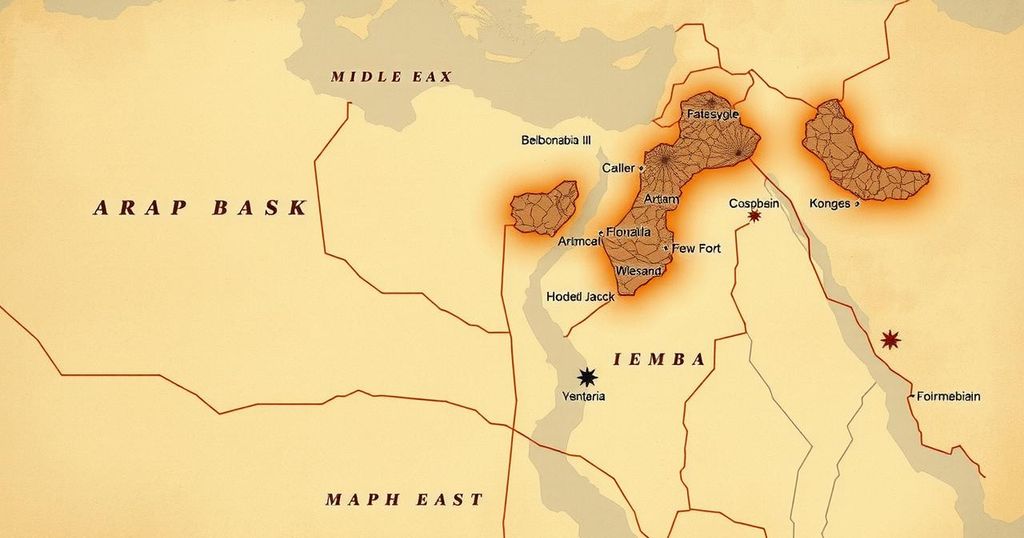Turkey is leveraging its influence over the Kurdish issue by using Abdullah Ocalan, the imprisoned PKK leader, to suppress Kurdish movements and maintain regional power. The recent presentation of a new Middle East map by Israel emphasizes the Kurds’ strategic role, potentially complicating Turkey’s objectives as Kurdish empowerment is viewed as a threat to its dominance and influence in the region.
Turkey continues to leverage the Kurdish issue as a tool for asserting its regional dominance, primarily utilizing Abdullah Ocalan, the imprisoned founder of the PKK, as its bargaining chip. By orchestrating a disarmament call from Ocalan aimed at all Kurdish groups, Ankara strives to minimize Kurdish political movements throughout the region, highlighting its ongoing disregard for Kurdish autonomy, a situation Ocalan attributes to the Turkish state’s repression of democratic avenues.
Ocalan has been pressured to moderate his stance, refraining from advocating for any political structure, even something as fundamental as federalism or administrative autonomy. Originally, the PKK sought to establish an independent Kurdistan across various countries, but ambitions have now been significantly diluted. This reduction raises critical questions about Turkey’s ulterior motives and Ocalan’s gradual concession of his governance model, reflecting the influence of Turkish governance on Kurdish political aspirations.
At the recent UN General Assembly, Prime Minister Benjamin Netanyahu revealed a new Middle East map that underscores the significant role of the Kurds. As a secular and democratic force with strong historical ties to Judaism, the Kurdish governance model positions them as strategic allies in the region’s changing dynamics, particularly as Syria’s power structure remains fractured among multiple factions.
Within Syria, the Syrian Democratic Forces (SDF) stand out as the primary liberal-democratic entity alongside smaller communities such as the Druze. Despite claims from Turkish officials that Ocalan’s disarmament appeal encompasses the SDF, General Mazloum Abdi emphasized that the call does not pertain directly to Syrian Kurds.
Turkey’s push towards Kurdish disarmament reflects its strategy to limit Israeli influence amid rising Kurdish significance, as Ankara perceives potential Kurdish empowerment as a direct threat to its interests. The timing of this initiative raises further questions regarding Erdogan’s sincerity in pursuing peace, particularly following the Hamas attack on Israel on October 7, 2023, and its connection to ongoing geopolitical contests in the region.
As Iran appears poised to emulate Turkey’s historical methods of ethnic suppression, the geopolitical complexities surrounding Kurdish identity persist. As Ankara fails to achieve its aims in Syria and internally, particularly in undermining Kurdish autonomy in Rojava Kurdistan, its bargaining power linked to Ocalan may erode.
Success for Turkey relies on its capability to weaken Kurdish political forces, but should this strategy falter, its influential capacity significantly diminishes. The potential alliance between the Kurds and Israel may become pivotal in countering Turkish and Iranian objectives, shaping regional stability and the future of Middle Eastern politics. The pressing question remains whether Israel will capitalize on this opportunity before it evaporates, potentially setting a course for understanding the significance of Kurdish interests in broader geopolitical strategies.
In summary, Turkey’s strategic maneuvering regarding the Kurdish issue is closely tied to regional power dynamics, particularly its concerns over Israeli influence and the empowerment of Kurdish movements. Abdullah Ocalan’s disarmament call, while appearing conciliatory, is more about Turkish hegemony than genuine peace. The evolving geopolitical landscape, particularly with possible Kurdish-Israeli alliances, presents new challenges and possibilities for regional stability. Turkey’s success in this complex game hinges on its ability to suppress Kurdish autonomy both within its borders and in Syria.
Original Source: www.jpost.com




